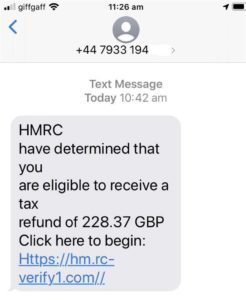This article highlights the recent HMRC scams and how you can best avoid making the mistakes which could impact you and your business.
It has been reported that cyber-criminals are targeting individuals as well as industries, including aerospace, transport, manufacturing, hospitality, healthcare and insurance.
Phishing emails have been sent to the unsuspecting public. Phishing is a type of social engineering attack often used to steal user data, including login credentials and credit card numbers. The fraudsters masquerade as a trusted entity with the intention of duping a victim into opening an email, instant message or text message.
The government is warning people to be aware of scam messages pretending to be from HM Revenue and Customs (HMRC). An example of the types of scams which have been reported include a fake text message sent to many people claiming the recipient is due a tax rebate and provides a link to click. An example of this below:

HMRC has warned about scam emails and texts and has sent out its own email highlighting “If someone gets in touch claiming to be from HMRC, saying that financial help can be claimed or that a tax refund is owed, and asks you to click on a link or to give information, such as your name, credit card or bank details, please do not respond.”
On 31 March 2020 it was reported that digital scammers are using coronavirus support measures to target individuals with bogus emails and texts claiming to be from HMRC.
As the details of government COVID-19 packages for businesses and employees are being finalised, cyber-criminals are sending scam communications pretending to offer financial support. One known example is an email scam offering a tax refund to help protect themselves from the coronavirus outbreak and another is a text message scam offering a goodwill payment.
At Mercer & Hole, we often talk about the proactive things ‘to do’ however, when it could involve a possible scam, always remember, it is about what ‘not to do.’
- Do not respond to any electronic communication in relation to monies via email
- Do not click on any links in any related message. This is not how HMRC would advise you of a potential tax refund
- Do not forward on the clickable links as a way of highlighting / warning others. You can make sure others other aware of the scam, particularly more vulnerable people. However, do this without risking forwarding on a clickable link.
HMRC says it never sends texts or emails to tell people this sort of important information. You can forward suspicious text messages to 60599 for HMRC staff to investigate – the text will be charged at your network rate. Also, e-mail examples can be sent to phishing@hmrc.gov.uk
If you are ever in doubt, please call your usual Mercer & Hole contact or get in touch with one of our partners to ask for advice.
We are always happy to help. The Mercer & Hole team are here to support you, your family and your business. Our Covid-19 Business Support Hub is regularly updated with information to support you and help provide clarity during this uncertain time.






 7 mins
7 mins 
